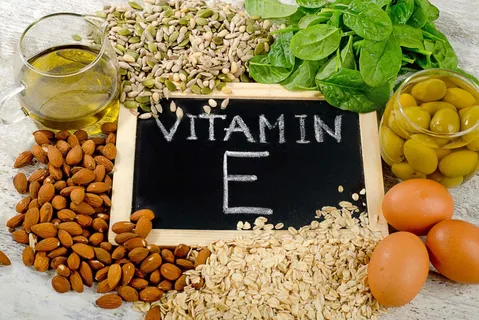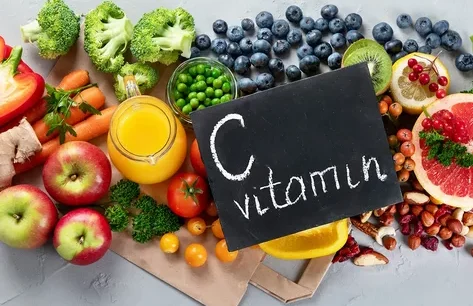Vitamin E is a vital nutrient known for its powerful antioxidant properties, playing a crucial role in maintaining cellular health. This fat-soluble vitamin is essential for protecting cells from oxidative damage, supporting immune function, and promoting skin health. In this guide, we’ll explore the significance of vitamin E for cellular health, its sources, benefits, and how to incorporate it into your diet effectively.
What is Vitamin E?
The Chemistry of Vitamin E
Vitamin E is a group of eight fat-soluble compounds, including four tocopherols and four tocotrienols. Alpha-tocopherol is the most active form in humans and is the standard for vitamin E activity. These compounds act as antioxidants, protecting cells from damage caused by free radicals.
Sources of Vitamin E
Vitamin E is naturally found in a variety of foods, including:
- Nuts and seeds (almonds, sunflower seeds)
- Vegetable oils (sunflower, safflower, and wheat germ oil)
- Green leafy vegetables (spinach, broccoli)
- Fortified cereals and other foods
The Role of Vitamin E in Cellular Health
Antioxidant Protection
One of the primary roles of vitamin E is to act as an antioxidant. Free radicals, unstable molecules produced during normal metabolic processes, can cause oxidative stress, damaging cell membranes, proteins, and DNA. Vitamin E neutralizes these free radicals, protecting cells from oxidative damage and contributing to overall cellular health.
Immune Function
Vitamin E enhances immune responses by supporting the growth of T cells, which are essential for the immune system. This helps the body to fight off infections and diseases more effectively.
Skin Health
Vitamin E is known for its benefits to skin health. It helps in maintaining skin integrity by protecting it from UV damage, reducing inflammation, and supporting wound healing. Its antioxidant properties also help in preventing premature aging by neutralizing free radicals that cause skin damage.
Cellular Signaling
Vitamin E plays a crucial role in cellular signaling and gene expression. It helps in the regulation of certain enzymes involved in cellular processes, ensuring that cells function properly and efficiently.
Benefits of Vitamin E for Specific Health Conditions
Cardiovascular Health
Vitamin E is believed to help in reducing the risk of cardiovascular diseases by preventing the oxidation of low-density lipoprotein (LDL) cholesterol. Oxidized LDL cholesterol is a key factor in the development of atherosclerosis, which can lead to heart attacks and strokes.
Eye Health
Vitamin E, along with other antioxidants, is beneficial for eye health. It helps in preventing age-related macular degeneration (AMD) and cataracts by protecting the cells of the eyes from oxidative damage.
Cognitive Health
Studies suggest that vitamin E may play a role in protecting cognitive health. Its antioxidant properties help in reducing oxidative stress in the brain, which is associated with neurodegenerative diseases such as Alzheimer’s.
Reproductive Health
Vitamin E is essential for reproductive health. It helps in the maintenance of healthy sperm and egg cells, thereby supporting fertility.
Recommended Daily Intake of Vitamin E
Dietary Recommendations
The Recommended Dietary Allowance (RDA) for vitamin E varies by age, sex, and life stage. For adults, the RDA is 15 milligrams (22.4 International Units) per day. This requirement can typically be met through a balanced diet that includes vitamin E-rich foods.
Supplements
In some cases, individuals may require vitamin E supplements to meet their daily needs, especially if they have conditions that impair fat absorption or certain genetic disorders. However, it’s important to consult a healthcare provider before starting any supplementation.
How to Incorporate More Vitamin E into Your Diet
Food Sources
Incorporating a variety of vitamin E-rich foods into your diet is the best way to ensure adequate intake. Here are some tips:
- Nuts and Seeds: Snack on almonds, sunflower seeds, or hazelnuts.
- Vegetable Oils: Use sunflower or safflower oil in your cooking.
- Green Leafy Vegetables: Add spinach or broccoli to your meals.
- Fortified Foods: Choose cereals and other foods fortified with vitamin E.
Cooking Tips
Vitamin E is sensitive to heat and light, so it’s important to store foods properly and avoid excessive cooking to preserve their vitamin E content. Use raw oils in salad dressings and add nuts and seeds to dishes after cooking.
Potential Risks and Side Effects
Overconsumption
While vitamin E is essential for health, excessive intake can lead to toxicity. Symptoms of vitamin E toxicity include nausea, diarrhea, stomach cramps, fatigue, and increased risk of bleeding due to its anticoagulant effects.
Interactions with Medications
Vitamin E can interact with certain medications, such as anticoagulants and chemotherapy drugs. It’s important to consult a healthcare provider before taking vitamin E supplements if you are on any medication.
FAQs
What is the primary function of vitamin E in the body?
Vitamin E acts primarily as an antioxidant, protecting cells from oxidative damage caused by free radicals. It also supports immune function, skin health, and cellular signaling.
Can vitamin E improve skin health?
Yes, vitamin E is known for its skin health benefits. It helps in protecting the skin from UV damage, reducing inflammation, and supporting wound healing, thereby preventing premature aging.
How much vitamin E do I need daily?
The Recommended Dietary Allowance (RDA) for vitamin E for adults is 15 milligrams (22.4 International Units) per day. This requirement can typically be met through a balanced diet.
What are some good dietary sources of vitamin E?
Good dietary sources of vitamin E include nuts and seeds (almonds, sunflower seeds), vegetable oils (sunflower, safflower, and wheat germ oil), green leafy vegetables (spinach, broccoli), and fortified cereals.
Can I get too much vitamin E?
Yes, excessive intake of vitamin E can lead to toxicity, with symptoms such as nausea, diarrhea, stomach cramps, fatigue, and increased risk of bleeding. It’s important to follow the recommended dietary allowance and consult a healthcare provider before taking supplements.
Is vitamin E beneficial for heart health?
Vitamin E is believed to help reduce the risk of cardiovascular diseases by preventing the oxidation of LDL cholesterol, which is a key factor in the development of atherosclerosis.
Does vitamin E support cognitive health?
Studies suggest that vitamin E may protect cognitive health by reducing oxidative stress in the brain, which is associated with neurodegenerative diseases such as Alzheimer’s.
Can vitamin E improve reproductive health?
Yes, vitamin E is essential for reproductive health. It helps in the maintenance of healthy sperm and egg cells, thereby supporting fertility.
Are there any interactions between vitamin E and medications?
Vitamin E can interact with certain medications, such as anticoagulants and chemotherapy drugs. It’s important to consult a healthcare provider before taking vitamin E supplements if you are on any medication.
How can I incorporate more vitamin E into my diet?
Incorporate a variety of vitamin E-rich foods into your diet, such as nuts and seeds, vegetable oils, green leafy vegetables, and fortified cereals. Use raw oils in salad dressings and add nuts and seeds to dishes after cooking to preserve their vitamin E content.
Conclusion
Vitamin E is a vital nutrient that plays a crucial role in maintaining cellular health. Its antioxidant properties protect cells from oxidative damage, support immune function, and promote skin health. By incorporating vitamin E-rich foods into your diet, you can ensure adequate intake of this essential vitamin and enjoy its numerous health benefits. Remember to consult a healthcare provider before starting any supplementation, especially if you have underlying health conditions or are taking medications. With a balanced diet and mindful lifestyle choices, you can harness the power of vitamin E to support your overall health and well-being.
- New Patient Treatment Near Shepperton, Surrey - May 9, 2025
- Neauvia Hydro Deluxe Skin Booster Treatments Near Puttenham, Surrey - May 8, 2025
- Exosome Therapy For Skin Rejuvenation Near Addlestone, Surrey - May 8, 2025



